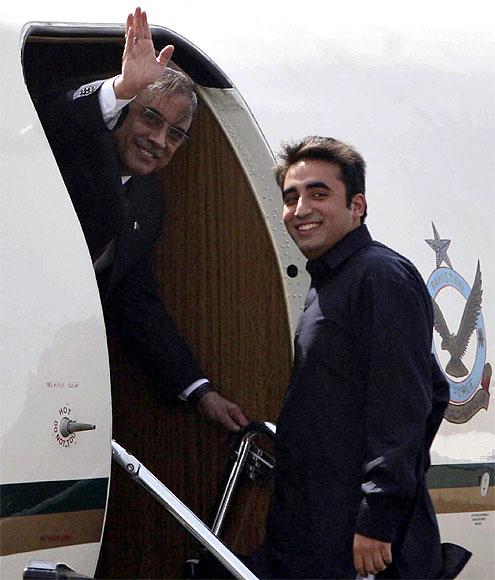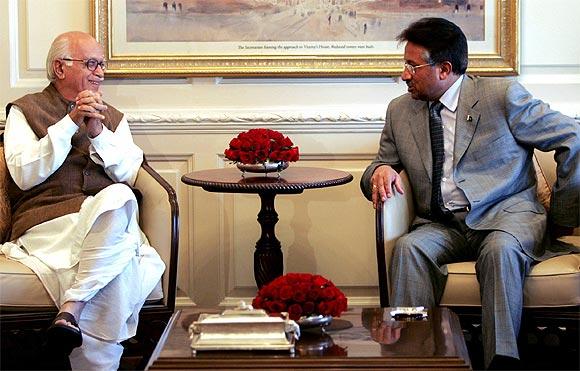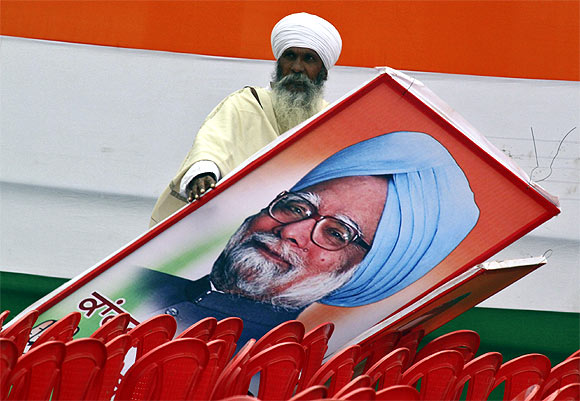Photographs: Reuters
Dr Singh would like to be remembered by history as the PM who achieved a breakthrough in India-Pakistan relations, believes Neerja Chowdhury
Delhi's South Block, beleaguered for months, had a reason to smile after Pakistan President Asif Zardari and his team flew back home last Sunday without striking any discordant notes.
That the government managed to stay a step ahead of the media was one important factor behind the success of the visit.
It managed to keep the electronic media, with its insatiable appetite, fed with information on a sustained basis, so that they had "breaking news" every hour. When there was nothing else, the government released the menu of the lunch to be hosted by Prime Minister Manmohan Singh for Zardari, on the eve of his visit.
The seating arrangement of the luncheon showed who was sitting next to whom -- Congress leader Rahul Gandhi was going to sit next to Pakistan Peoples Party chief and Zardari's son Bilawal Bhutto, Home Minister P Chidambaram would sit on one side of Pakistan Interior minister Rehman Malik and Bharatiya Janata Party leader L K Advani would sit on the other side.
Click on NEXT for more...
Zardari, Dr Singh surprised the media
Image: Prime Minister Manmohan Singh with Zardari in DelhiPhotographs: Prakash Singh/Reuters
When Zardari arrived an hour late from Lahore, the media began to speculate that this was a deliberate attempt to cut short his one-on-one meeting with the PM, since heads of state do not usually arrive late. But the government ensured that Zardari was ensconced with the PM for the entire 45 minutes, shortening the time allocated for lunch, thereby scotching all such speculation.
From the accounts available now from the Indian side, the delay was caused by the confabulation Zardari was having with Pakistan Army chief Ashfaq Parvez Kayani, Inter Services Intelligence officials and Pakistan Foreign Minister Hina Rabbani Khar, prior to his departure.
The piece de resistance of the visit was when the Pakistan president and Dr Singh walked out together after their meeting and faced the cameras of Doordarshan and Pakistan TV -- to make their 'positive' statements -- probably before the media from either side of the border could realise what was happening.
Soon thereafter came the more substantive briefing by Foreign Secretary Ranjan Mathai, about what had transpired between the two leaders, to keep the news-hungry scribes satisfied. The PM is believed to have met with a dozen of his aides immediately after the lunch to formulate the salient points that could be made public.
Click on NEXT for more...
Advani and the irony at lunch
Image: A Pakistani boy presents a bouquet to then Prime Minister Atal Bihari Vajpayee at Wagah border near LahorePhotographs: Reuters
It was an ironical situation.
The Pakistan president, who was on a private visit to pay obeisance at Khwaja Moinuddin Chishti's shrine in Ajmer, faced the cameras together with Dr Singh and talked about moving bilateral relations forward. It was almost like a joint statement without being one.
When former Pakistan President General Pervez Musharraf had come to India in 2001 to attend the Agra summit, he had gone back without issuing a joint statement -- and without being able to visit Ajmer Sharif as he had hoped to do.
General Musharraf was the all-powerful leader in his country at that time.
On the Indian side, it used to be said that if someone could swing a breakthrough in India-Pakistan relations, it would be then prime minister Atal Bihari Vajpayee, who had undertaken the Lahore yatra and then invited Musharraf to India. But the breakthrough was not meant to be.
In Agra, it was Home Minister LK Advani who had stopped the issuance of a joint statement by Musharraf and Vajpayee. And on Sunday -- this too is not without its irony -- the same Advani sat beside the interior minister of Pakistan, not as the home minister of India but as the chairman of the opposition National Democratic Alliance, watching different players playing a pivotal role.
Click on NEXT for more...
A weak Indian PM, a beleaguered Pakistan president
Image: Former Pakistan President Pervez Musharraf with BJP leader LK AdvaniPhotographs: Desmond Boylan/Reuters
On Sunday, it was a weak Indian prime minister and an equally beleaguered president of Pakistan who stood side by side to say their piece, though its import was not lost on people.
The Pakistan president is believed to have indicated that a settlement on the Sir Creek issue, a liberal visa regime -- which is expected to be signed when the home secretaries of both countries meet in May this year -- and enhanced trade between the two countries were all doable measures.
In fact, he is believed to have probed about how India managed to have a growing quantum of trade with China despite the differences between the two countries. Zardari, who is backed by the business community in his country, was fascinated by the India-China model of normalising relations.
It may well be asked whether Zardari is in a position to deliver on what he might have promised Dr Singh. After all, his position in Pakistan is uncertain today. He is under the scanner of the judiciary and has an uneasy relationship with the army.
On the eve of his India visit, he had revealed that he had been asked to leave Pakistan, though he did not disclose who had asked him to do so.
Click on NEXT for more...
Dr Singh would like to be remembered by history
Image: A billboard of Prime Minister Manmohan SinghPhotographs: Ajay Verma/Reuters
Clearly, Zardari came to India for his own reasons. His visit can be viewed as an attempt towards reaching out to the Western public opinion and re-establishing his relevance -- by showing that he is a moderate who is trying for peace and normalcy with India.
Zardari's 'sufi diplomacy' was obviously aimed at reinforcing this impression, and seeking the West's help to rein in the army in his country. Pakistan, long considered as a 'haven of terror', is now a cause of concern for the West.
When word came from Zardari that he wanted to visit Ajmer Sharif, Dr Singh decided to use the opportunity to push the 'step by step' dialogue which has replaced the 'composite dialogue' process, by hosting a luncheon for the Pakistan president.
This move was not without its risks, given the way the Agra summit had failed and the PM's attempt to think 'out of the box' at the Non-Alignment Movement's summit in Sharm-el-Sheikh had bombed.
Dr Singh would like to be remembered by history as the PM who achieved a breakthrough in India-Pakistan relations and on the Kashmir issue.
Click on NEXT for more...
Why Sonia, Pranab stayed away from the lunch
Image: Bilawal Bhutto with Union minister Pawan Bansal at the Delhi airportPhotographs: Reuters
The once-bitten-twice-shy prime minister was careful this time as he told his guest that improved relations between the two countries were contingent on how quickly Pakistan took action against sponsors of terror like Jamaat-ud-Dawa chief Hafiz Saeed, who had masterminded the Mumbai terror attack.
Though Zardari said the issue needed further discussions, he is believed to have informed the PM about the difficulties in taking action against Saeed, since he had been arrested several times but released by the courts every single time.
Though the prime minister has accepted Asif Zardari's invitation to visit Pakistan, and Rahul Gandhi has accepted Bilawal Bhutto's invitation, it will be difficult for either of the leaders to travel to the neighbouring nation unless Islamabad takes some steps to rein in Hafiz Saeed.
The Congress would not want to give another issue to the BJP which the Opposition party can use against it.
Caution could be one reason why Congress president Sonia Gandhi and Finance Minister Pranab Mukherjee stayed away from the lunch. This would ensure that the visit was not hyped too much, lest something went wrong with it or nothing much came out of it.
Of course, the Congress may not have wanted to put Sonia Gandhi, the president of the ruling party, along with the much younger Bilawal, who heads the ruling PPP in his country.
Though India was careful about not raising expectations, the Zardari visit, as it has panned out, was a step towards repairing relations between the two countries after the 26/11 terror strike had halted all dialogue between India and Pakistan.
Click on NEXT for more...







article